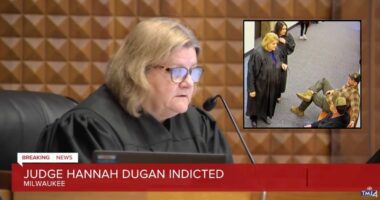
President Donald Trump participates in a session of the G7 Summit, Monday, June 16, 2025, in Kananaskis, Canada. (AP Photo/Mark Schiefelbein)
A federal judge ruled that the Trump administration cannot carry out mass firings at the Education Department’s Office of Civil Rights, deeming such an action as unconstitutional.
U.S. District Judge Myong Joun of Massachusetts issued a preliminary injunction against the planned large-scale reduction in force announced on March 11. He stated in his decision that there was a “likelihood of success” for the plaintiffs’ argument that the reduction was “arbitrary and capricious” and that it would cause “irreparable harm” to those affected.
Love true crime? Sign up for our newsletter, The Law&Crime Docket, to get the latest real-life crime stories delivered right to your inbox.
The lawsuit was filed by two students who had experienced severe race-based and disability-based harassment in school, along with their parents, and the Victim Rights Law Center (VRLC), a nonprofit organization that advocates for victims of sex-based harassment.
The plaintiffs argued the RIF would restrict the Office of Civil Rights (OCR), whose mission is to “ensure equal access to education and to promote educational excellence through vigorous enforcement of civil rights in our nation’s schools,” from being able to carry out its designed functions.
Joun, a Joe Biden appointee, found that there was merit to this claim.
“[T]he RIF leaves OCR with the capacity to address only a small fraction of the complaints that it receives, making it impossible for OCR to comply with its statutory and regulatory obligations,” he wrote, pointing to “shuttered offices” and the loss of “regional expertise and community relationships.”
“The closings have made it costly and often infeasible for investigators to visit schools in-person to gather critical facts, making it impossible for OCR to complete investigations and cases promptly and fairly,” Joun added.
He found that, when schools are either participating in discrimination or allowing it to continue, the only place students can turn is OCR. And because the student plaintiffs are unable to return to school while their cases continue, and the investigations in these cases have stalled due to the RIF, “they face irreparable harm.”
As it concerns VRLC, Joun wrote that because the organization has had to deviate from its “core mission” of “providing legal recourse to victims of sexual and gender-based violence” because it no longer has OCR as a resource, it, too, faces “irreparable harm.”
“Taken together, the detriment Plaintiffs face cannot be remedied through retroactive relief or money damages. Thus, I am convinced that, absent an injunction, the risk of harm to Plaintiffs is immediate and irreparable,” the judge wrote.
As part of the order, the Trump administration is not just prohibited from carrying out its March 11 RIF as to the OCR, but it must “take all steps necessary to facilitate the return” of employees fired or set to be fired. The federal government was also given 72 hours to file a status report of its actions to comply.
As Joun noted, the lawsuit was similar to one he heard filed by nearly two dozen attorneys general, school districts, and other organizations in March after the RIF was filed and Education Secretary Linda McMahon suggested it was an initial step toward the full-scale shuttering of the department.
In that case, which was not tailored to the OCR specifically, the Boston-based judge also granted a preliminary injunction, finding that the “RIF effectively eliminates the Department without Congressional approval, in violation of the APA and the Constitution.” He said that a separate decision was warranted in the case concerning his Tuesday order to “address the unique harms [the plaintiffs] are suffering.”








